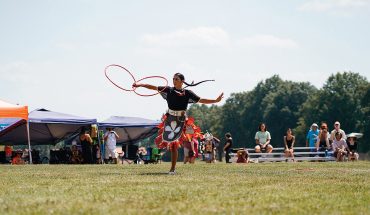ARTS ACCESS
The Nasher caters to visitors
with memory loss
by Jessie Ammons
J Caldwell for Nasher Museum of Art at Duke University
November is National Alzheimer’s Awareness month, a cause the Nasher Museum of Art at Duke University serves directly through a program called Reflections. “The community would be appalled if the Nasher wasn’t accessible to third-grade students,” says Jessica Ruhle, director of education and public programs. “I think the expectation should be the same for those with memory loss: We should provide appropriate programming for everybody.” Reflections provides free monthly tours designed for visitors with Alzheimer’s or other memory loss conditions and their care partners. The one-hour guided sessions have a theme, and conclude with live music or art-making related to that theme. The program has hit a chord: “We have been thrilled with the turnout,” Ruhle says.
Ruhle says many Reflections participants are people who were formerly active in their museum and arts communities, but who feel shut out, self-conscious, or nervous with the onset of memory loss. A dedicated tour provides a safe place to rediscover that community. Reflections’ public tours began in April 2017, and already attract many regulars. “It’s been a real joy to build ongoing relationships with these visitors,” Ruhle says. “We know what they like and we know things about their lives. It’s incredible. And it makes the tour itself so nuanced and particular, because we’re leading people we’ve known for months.”
Rule says this program is unique to the Triangle, and that its approach has benefited from a close relationship with the Duke University Medical Center. “Other art museums simply don’t have access to a medical community,” Ruhle says. The program brings new meaning to “our role as a university art museum,” Ruhle says, and has built bridges with the Duke Family Support Program and often the North Carolina Alzheimer’s Association as well. “This is less about a single museum offering programs and more about a community becoming dementia-friendly and dementia-inclusive.”
It’s a mission the Nasher hopes to spread. Last summer, the museum hosted an Alzheimer’s and Dementia Museum Programs Symposium that attracted more than 70 museums from across the nation, and has already helped six other North Carolina museums launch similar programs in the last few years. “We want to show other institutions just how do-able this is.”
You can learn more and see monthly Reflections gathering times at: nasher.duke.edu/community/#reflections




